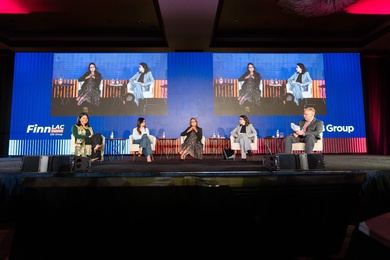Store Brands, a Unique Opportunity for MSMEs and Women's Businesses

Private labels, also known as store brands or own labels, have become a significant part of the retail landscape in Latin America and the Caribbean.
These products, wholly owned and controlled by retailers, offer affordable, high-quality alternatives to national and international commercial brands.
You May Also Like
- By Adopting Traceability in Its Supply Chain, This Company Managed to Become More Sustainable
- Science Dyes in Green Honduras' Textile Industry
Initially perceived as generic and low-quality, private label products have evolved into competitive alternatives that attract and retain customers.
As own labels gain traction, they present unique opportunities for local micro, small, and medium enterprises (MSMEs), particularly women-owned and led, to become integral parts of the retailer’s supply chain.
The study Private Labels in the Latin American and Caribbean Grocery Market: An Analysis of Local Supply Chains and the Inclusion of Micro, Small, and Medium Enterprises, with a Gender Perspective was recently published by IDB Invest and Accenture.
It showcases strategies for building sustainable and responsible private label supply chains based on the experience of five major supermarkets chains in the region:
Ta-Ta Supermarkets in Uruguay
Grupo La Anónima in Argentina
Grupo Éxito in Colombia
Walmart in Mexico and Central America
Carrefour in Argentina and Brazil
The study analyzes survey data from over 1,000 consumers and 230 MSMEs, as well as insights from interviews with the five retailers and 25 of their private label suppliers to understand the region’s private label landscape.
Consumer Insights
Retailers are increasingly adopting store brands as a strategic differentiation and customer loyalty tool.

The consumer surveys we carried out show that 32% of respondents regularly purchase private label products and 46% do so because of their lower prices.
Consumers also signal the importance of locally produced products: about 68% said they would be more likely to buy private label products made by local MSMEs, with 69% willing to pay a premium.
An Opportunity for Retailers and MSMEs
Retailers often outsource the manufacturing of their private label products, opening the door for local MSME suppliers.
Benefits of sourcing from MSMEs include cost savings, better quality control, and greater flexibility to adapt products given their simpler structure and processes. Increased innovation is another plus since MSMEs are typically open to developing new products and building relationships with corporate partners.
For MSMEs, accessing new sales and distribution channels through these supply chains is a big benefit. Nearly 60% of surveyed suppliers say that joining a private label supply chain allowed them to thrive in new markets and regions.
Increased production, sales, and efficiency are other important benefits. By engaging with retailers, MSMEs may also adopt higher quality standards: 26% of suppliers reported adjusting their processes to offer better products for private labels.
Challenges Faced by MSMEs
Despite the opportunities, MSMEs face challenges in becoming store brand suppliers.
One is basic awareness. About 30% of suppliers were not even aware of opportunities to produce for private label brands until the retailers approached them. This underscores the importance of proactive, targeted outreach strategies for retailers looking to source from MSMEs.
More on Gender and Financing
- How Can We Advance Gender Equality in the Private Sector? Financial Incentives May Help
- A Woman Entrepreneur Gets a Loan, What Happens Next? Track the Impact to Find Out
Limited production capacity and outdated technology are also significant barriers, as are financial constraints. Access to credit, particularly for capital investments and working capital, is a top concern for 16% of suppliers and nearly half feel that retailers’ payment terms are an obstacle.
For retailers, understanding these challenges and creating supplier development programs to address them―including financial support such as shorter payment cycles or low interest loans―is key to building a successful and inclusive private label supply chain.
Gender Perspective
Including women-led MSMEs in these private label supply chains is particularly important.
Women-led businesses currently earn less than one percent of large companies’ spending on suppliers. However, women-led MSMEs bring unique advantages, including enhanced innovation, better brand value, and greater investor attraction.
JOIN A COMMUNITY OF 40,000 DEVELOPMENT LEADERS
GET THE LATEST ON OUR PROJECTS AND KNOWLEDGE

IDB Invest's experience with anchor companies that have intentionally increased women-led businesses as suppliers of products and services shows that women's limited access to finance often pushes them to deliver high-quality products, sometimes even at a faster pace, as they highly value receiving cash sooner.
Despite these benefits, women-led MSMEs face additional hurdles, such as gender discrimination in loan applications, difficulty in accessing supply chains, and lack of asset ownership.
Win-Win
Private labels in Latin America and the Caribbean are more than just a retail trend; they can catalyze economic development and social inclusion to the benefit of all stakeholders, including consumers, MSMEs, and retailers.
Realizing their full potential calls for collaboration among retailers, policymakers, and financial institutions to address the challenges MSMEs, particularly those led by women, face in joining these supply chains.
In addition to the IDB Invest-Accenture Private Labels in the Latin American and Caribbean Grocery Market study, check out this accompanying strategic guide for retailers that outlines four steps for developing private label brands and inclusive value chains.
LIKE WHAT YOU JUST READ?
Subscribe to our mailing list to stay informed on the latest IDB Invest news, blog posts, upcoming events, and to learn more about specific areas of interest.
Subscribe



